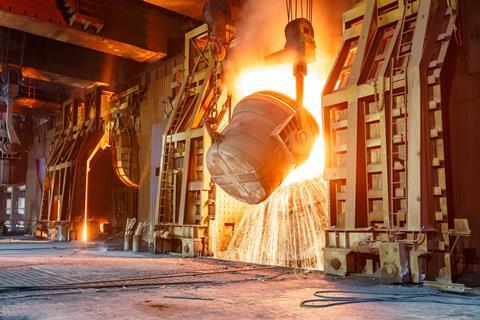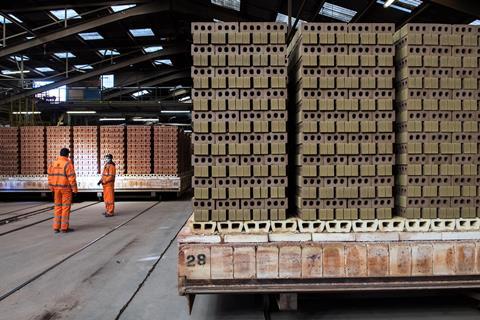Jobs could be lost at energy intensive manufacturers unless ministers act
Manufacturers of energy-intensive building products are calling on ministers to intervene to prevent industrial jobs being lost in levelling up priority areas due to soaring electricity and gas costs.

Bodies including the Energy Industrial Users Group (EIUG), which represents manufacturers of steel, chemicals, fertilisers, paper, glass, cement, lime, ceramics, and industrial gases are warning that ministers must act to help its members to keep costs down.
Manufacturers are concerned that the UK’s electricity costs are higher than other European countries due to several factors, including fewer subsidies for decarbonisation policy costs, the UK’s gas-heavy energy mix and a relatively high carbon price.
>> Also read: Is construction ready for a full-blown energy costs crisis?
> High energy costs – it’s not just households who are feeling the pinch
UK Steel research has found that electricity and gas costs for steel manufacturers in the UK have quadrupled in the past year, with the price of electricity now 61% and 51% more expensive in the UK than in France and Germany respectively.
Manufacturers face either having to absorb the hit to their profit or pass the costs on to customers, who may ultimately decide to shop abroad for products. They argue that this could ultimately derail the government’s ambition to level up the UK by spreading wealth and opportunity to areas outside of London and the South-east.
Richard Leese, chair of the EIUG and MPA Cement: “It’s really stark. We saw the government’s levelling up strategy and then the next day we saw intervention for domestic consumers – but no consideration was given for the jobs in those levelling up areas that energy intensive industries (EIIs) provide.
“We don’t have plants in the square mile of London, our plants are in the North-west and North-east, south Wales and north Wales, where these jobs really mean something.”
Leese warned of a “slow drip in production moving off-shore” without government support.
As well as levelling up, manufacturers say that supporting EIIs will help with net zero goals.
Gareth Stace, director general at UK Steel said: “We want to get to net zero and have a fully-worked out plan, and then on levelling up we employ 31,000 people in those levelling up areas.”

Keith Aldis, chief executive of the Brick Development Association said many brick manufacturers, including Forterra, have begun to increase prices by about 10% although others have sufficient hedging in place to mitigate the immediate impact.
Aldis called for a cut in VAT or direct support for the industry. He also warned customers to check the provenance of the bricks they buy as many made outside of the European Union may not be environmentally friendly or may have been made with slave labour.
“Anyone who is citing net zero and/or ethics in their businesses, yet are trading in these products, are essentially fooling the public,” he said.
The manufacturers’ concerns come amid deepening gloom at all levels of the building industry about energy cost increases fuelling building inflation. Glenigan last week found that project start values have fallen for the fourth month in a row and may be linked to rising materials prices.
Brian Berry, chief executive of the Federation of Master Builders, is warning smaller and mid-sized builders to draw up flexible contracts “to allow for fluctuating materials costs”.
The Home Builders Federation is concerned that rising materials costs could combine with an estimated £3bn of extra regulatory burdens a year to make new housing schemes unviable.
The EIUG warns that the government’s current exemption from green costs for energy intensive industries in some circumstances is not responsive enough to deal with the current energy crisis as it requires firms to demonstrate that electricity costs are more than 20% of gross value added over three years. It says compensation schemes only help a small number of businesses and are based on outdated carbon prices.
The government’s emissions trading scheme authority also angered the EIUG last month by refusing to intervene on high carbon prices despite the breaching of the threshold that allows it to do so.
The business department said the government has provided more than £2bn in support to EIIs to make electricity costs competitive since 2013.
A spokesperson added: “Ministers continue to engage with the construction industry and other sectors to understand and to help mitigate the impacts of high global gas prices.”
He also said that there were “no indications that product or material costs will lead to delays in the delivery of major projects”.


























No comments yet